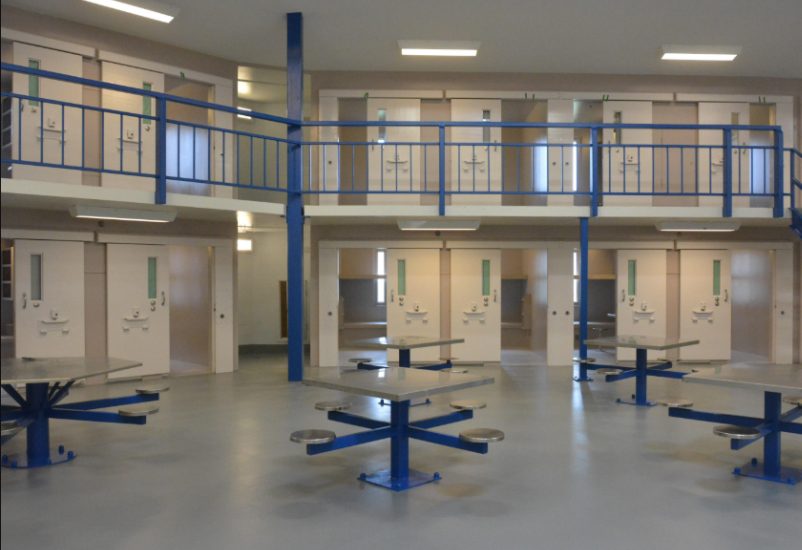
KJIPUKTUK (Halifax) – A new report, Conditions of confinement in men’s provincial jails in Nova Scotia, published by the East Coast Prison Justice Society (ECPJS), raises serious concerns about conditions in provincial jails, miserable even under normal circumstances and now further aggravated by Covid-related lockdowns.
The Visiting Committee (VC), initiated by ECPJS, works closely with prisoners in order to identify systemic issues inside provincial institutions, and bring them to the attention of prison administration, hopefully to be resolved.
While the Elizabeth Fry Society of Mainland Nova Scotia, has a program of human rights monitoring for women and non-binary prisoners in Nova Scotia, there is little formalized monitoring by third parties of prison conditions in provincial jails for men, so the VC program is filling a gap.
Permission was acquired from Correctional Services to meet in person with groups of prisoners for extended periods of time. However, such a meeting occurred only once, in February 2020, in the Central Nova Scotia Correctional Facility in Burnside. Next the pandemic arrived in Nova Scotia, and that approach was no longer possible.
Instead, the ECPJS VC started a phone-in program allowing prisoners to raise and discuss issues that way. People did call in, but the report notes that such phone calls were not as effective as in person meetings.
It’s an extensive report, with sections on the deprivation of liberty, cleanliness and hygiene, ability to communicate with loved ones and legal support, access to programs, human rights violations, and much more. There’s no way this short news brief can do it full justice.
Sheila Wildeman, a law professor at Dalhousie University, is co-chair of the ECPJS. For Wildeman there are three issues that stand out among the many concerns the report identifies. There is the negative impact of lockdowns on prisoners’ lives, there are issues around access to healthcare, and, taking a step back, the lack of oversight and transparency in terms of what is happening to incarcerated individuals.
Lockdowns
“In all the feedback we received, it was the lockdowns that people kept centering their responses on. What people found really hard was this isolation, together with the indefiniteness of that isolation. It’s been shown that this is really harmful to mental health. We heard from people who told us they had tried suicide and had not been given access to mental health support or a doctor,” Wildeman says.
The effects of lockdowns can manifest in various ways, varying from the time spent in a cell, conditions met while spending time in quarantine, to limits to exercise outdoors, access to gyms, etc.
Over the course of the year, some individuals reported being locked down 80 to 90 percent over periods of time stretching back many weeks, if not months.
Access to healthcare
Another issue that was frequently raised is around the difficulties prisoners encounter when seeking access to healthcare, Wildeman says.
Healthcare initially wasn’t even within the project’s scope, because the project was undertaken in cooperation with the department of Justice Correctional Services, while access to healthcare in prisons is the responsibility of Nova Scotia Health.
“Within the first few minutes the comments are going to gravitate to two things, lockdowns, and access to physical health care, dental care, mental health care, medications, all the things that we write about in the report,” she says.
The report mentions cases where individuals were cut off their prescription medications upon entry, as well as lack of timely access to prescription medication. Individuals also reported lack of access to assessments by doctors.
In one particularly shocking case in February 2020, the report mentions a man suffering from an acute injury who was denied access to a medical assessment for several days after being admitted on a Friday night, after suffering a fall, and who had significant pain and knee issues. He additionally reported being denied his methadone.
Oversight
Finally, as an example of how oversight of Correctional Services falls short, Wildeman mentions the Office of the Ombudsman, tasked by the province with performing quarterly audits of close confinement.
“Since that time, no public reporting has been made (including in the Ombudsman’s Annual Reports) regarding the nature of this oversight role, what the Ombudsman has learned, or what if any remediation of correctional non-compliance with law and policy has been made, the ECPJS report states.
Although not strictly speaking an oversight component, the report finds that an internal complaint system doesn’t even meet some of the standards set out in policy.
“Contrary to the requirements detailed above, people in custody report that it is common practice to submit complaints to any staff member, rather than a designated employee. Further, people reported that they do not regularly receive any written acknowledgment of their complaint, leading many to express skepticism regarding the efficacy and legitimacy of the internal complaint procedure,” the ECPJS report states.
See also: Statement by Burnside prisoners: We will continue to speak and fight until no more lives are lost
Check out our new community calendar!
With a special thanks to our generous donors who make publication of the Nova Scotia Advocate possible.
Subscribe to the Nova Scotia Advocate weekly digest and never miss an article again. It’s free!



